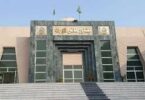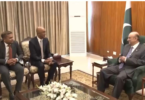F.P. Report
PESHAWAR: Chief Minister Khyber Pakhtunkhwa Mahmood Khan presided over a meeting that decided the accelerated completion of 1188 schemes including 388 at district level, 726 schemes in other sectors and the 246 near to completion schemes in the tribal districts that would cost Rs.24 billion. The provincial government, he added has initiated self employment scheme with initial amount of 1.1 billion for the tribal youth and assured the provision of resources for the university and the strengthening of DHQs and BHUs in the newly merged districts. The standardization of schools would cost 1.5 billion, 19 sports grounds would be upgraded and other six sports grounds would be constructed in tribal districts, he added.
The Cabinet meeting was attended by provincial ministers, Advisors to Chief Minister, Special Assistants, Chief Secretary, Additional Chief Secretary and Administrative Secretaries. The meeting took for debate a 14 point agenda topped by the developmental and rehabilitation activities in the newly merged districts of the erstwhile FATA and made a number of decisions.
The Chief Minister directed for the accelerated solarization of projects in the newly merged districts, the construction of integrated municipal complexes in tribal districts. The Cabinet also approved the upgradation of sub Tehsil Martoong Shangla to the full fledged Tehsil with its headquarter in Kooz Kale. The cabinet also approved Khyber Pakhtunkhwa excise duty of minerals, labour welfare act 2018 and regularization of services of 54 employees of Mass Transit Department for which the cabinet approved the KP employment of transport and mass transit department regularization of services act 2018. This would be brought to the provincial assembly for final approval.
The cabinet also agreed to the establishment of child labour and protection commission and the MPAs Pir Fida, Sumaira Shams, Dr. Abdul Ghafoor and Imam Masjid Angoor wali Qissa Khwani Peshawar as its members for the period of 3 years.
The cabinet also approved the child protection and welfare rules 2016 in order to make Zamung Kor Project totally operational and include private members in the management committee. It also approved Khyber Pakhtunkhwa Information commission, conduct of business procedure and disposal of complaints rules 2019 in order to further make the law effective to address the public complaints.
The cabinet also approved the nomination of directors for the board of general provident fund investment fund and pension fund that would ease out the payment of dues on account of GP fund. The cabinet also approved the revised management positions scales MP-I, MP-II and MP-III in order to remove disparity among the scales, salaries and perks between federal and provincial levels. The MP-I getting 298300 would now receive 433950 MP-ii receiving 121000 would now receive 181500 and the MP-iii getting 84700 would now get 127050 respectively.
The cabinet also cleared Rs.106.669 million as a supplementary grant for the repair of Chishma Right Bank Canal for onward payment to WAPDA. The cabinet also approved 122.50 million for the Kidney Center Hayatabad for the treatment of needy people under the Peshawar High Court verdict.
The Chief Minister said his government would provide all out support for the efficient health care delivery to the needy and poor people. The cabinet also approved the appointment of Judge Syed Ubaidullah Shah as Administrative Judge of the anti terrorism court-I Swat. The cabinet also amended the lisailul Mahroom foundation Act 2015 allowing the PAS, PMS and PCS officers of Grade-20 to be transferred and posted as managing director of the foundation.
The Chief Minister said the provincial government was going all out for the accelerated development of newly merged districts bringing the people of these areas to the national stream of development. His government would work on the infrastructure development and rehabilitation adding that his government has already planned a number of schemes with the cost of billions for the political and economic integration of these hitherto neglected areas of the province. We would install a complete structure of services in all sectors. He said that his government has done a lot of regularization of the temporary, adhoc and projects employees and now they are bound to deliver with the same zeal and commitment as the government had given them an opportunity to prove their work in public service, he added.
The Chief Minister said that the right to information was a law that his previous government introduced for elimination of corrupt practices. The new amendment should bring further dynamism to totally eliminate corrupt practices to ensure total transparency at all tiers of governance. The development activities would continue but what was more important is the focus to work for the poor in the society. In the newly merged areas there would be two approaches simultaneously working for the reconstruction and public welfare under the definite aim to remove the sense of deprivation of the tribal people adding that we have introduced a collective developmental strategy focusing more on all sectors in tribal districts. He particularly referred to the Rs.1.1 billion initial self employment scheme for the tribal youth which was not the end but the beginning of a course of action to enable the youth of tribal areas to start their own business and be able to look after their families.
He further assured to provide resources for the Primes Minister announced University and his own announcements for different development schemes in the tribal areas adding that the standardization of schools in newly merged districts would be initiated with the cost of Rs. 1.5 billion. More than two dozen sports grounds would provide sporting and recreational facilities to the youth. He also directed for the accelerated work for the solarization projects for the tribal areas and adding that the integrated municipal complexes would be built in the newly merged districts for the provision of efficient delivery under one roof.
He also asked for the identification and allocation of land for the cottage industries in the tribal districts.






